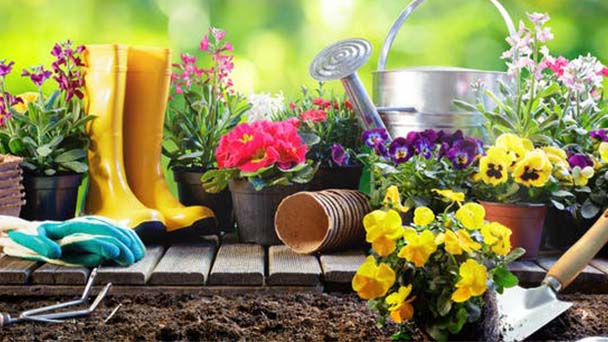How to prepare garden for spring
Written by Joy
Sep 28 2020

Whether your garden has only a few pots or an entire acre or more of land, you can use routine work such as weeding, composting, and planting cover crops to prepare garden for spring. Early spring is the season of recovery. Waking up the garden to a new growing season is the most important thing for every gardener.
In a garden with vegetables, and how to make their best harvest, may be easier than you think. If you plan correctly, you can enjoy a beautiful garden full of the fruits of your labor without having to spend hours raising it. Planting a garden that includes vegetables and flowers means you have incorporated a natural companion, which can turn the potential eye into an attractive landscape feature. So how to prepare garden for spring? 
Then you should focus on cultivating your soil to prepare garden for spring. Heavy rain, gravity and other forces may cause the soil to become firm over time, so it should be a top priority to loosen it before planting. It's a good choice to remove the rocks, dry the soil, use a shovel or fork and crush. For gardening tools, you can use lubricating oil to lubricate any moving parts to keep them in their best working condition.
In a garden with vegetables, and how to make their best harvest, may be easier than you think. If you plan correctly, you can enjoy a beautiful garden full of the fruits of your labor without having to spend hours raising it. Planting a garden that includes vegetables and flowers means you have incorporated a natural companion, which can turn the potential eye into an attractive landscape feature. So how to prepare garden for spring?

Prepare your soil
Season weeds may poke their heads on your garden land, so you'd better pull them out as early as possible. Otherwise they will flower, seed and reproduce. After you have processed the weeds, add some fertilizer and mix it into the soil to prepare garden for spring.Best free fertilizer
The content of the three main phytonutrients labeled as fertilizers, nitrogen, phosphorus and potassium. Most organic fertilizers are much more expensive than synthetic chemicals. We can use our own kitchen waste to compost early for later use, and cover your garden bed with a good compost layer of at least 1 inch a few weeks before planting. Compost will provide the soil with nutrient-rich organic matter and improve the soil's ability to process water and nourish crops.Then you should focus on cultivating your soil to prepare garden for spring. Heavy rain, gravity and other forces may cause the soil to become firm over time, so it should be a top priority to loosen it before planting. It's a good choice to remove the rocks, dry the soil, use a shovel or fork and crush. For gardening tools, you can use lubricating oil to lubricate any moving parts to keep them in their best working condition.
Planting
Vegetable planting allows you to taste delicious fruits and vegetables with the smell of sunshine from the garden. The taste and texture of self-grown will far exceed those purchased in the market. If you are new to vegetable garden dishes, here are some guidelines and tips, they may be able to help you get started right.Sun
Choosing a sunny place for your garden-this means direct sunlight for at least 6 hours of the day. This is especially important for fruitful crops such as tomatoes, peppers and pumpkins. For some crops, such as lettuce and spinach, as long as 3 or 4 hours of direct sunlight, you can choose the best sunlight for your garden to prepare garden for spring better.Soil
In the sun, the most important factor for growing vegetables is healthy soil. You should ensure that the soil is well drained (no water will accumulate after rain). Most garden soils benefit from adding organic matter, especially compost. Organic matter can improve drainage and water holding capacity, and provide some nutrients.Position
You can choose a place that is as convenient as possible. You have to visit the garden every day to check the progress and get a weed or two. You also need a water supply.Latest Updated
- Benefits of Bugleweed - 7 Science-backed Health Benefits
- Bugleweed Dangers & Side Effects - Is It Poisonous?
- How to Plant Evergreen Trees - What You Should Know
- When to Plant Evergreens - Grow Guide for Evergreen Trees
- 12 Wonderful Evergreen Shrubs for Your Garden
- 12 Popular Evergreen Plants with Pictures for Beginners
- When And How To Prune A Lilac Bush Like a Pro
- How to Grow & Care for Lilac Vine (Hardenbergia Violacea)
- Japanese Lilac Tree (Syringa Reticulata) Care & Propagation Guide
- Shumard Oak Pros and Cons - What to Know
Popular Articles
- Winter maintenance of Antirrhinum Majus
- How to Grow Terminalia Mantaly Tree
- How to Grow and Care for Crossostephium Chinense
- How to grow Antirrhinum Majus in spring
- Peristeria Elata (Dove Orchid) Profile: Info & Care Guide
- Underwatered Snake Plant (Sansevieria Trifasciata) - Signs And How To Fix
- How to Care for Brazilian Jasmine Plant (Mandevilla Sanderi)
- How to Grow & Care for Graptopetalum Purple Delight in Summer
- Rosa Chinensis (China Rose): Plant Growing & Care Tips
- How to Care for Baby Sun Rose (Aptenia Cordifolia)